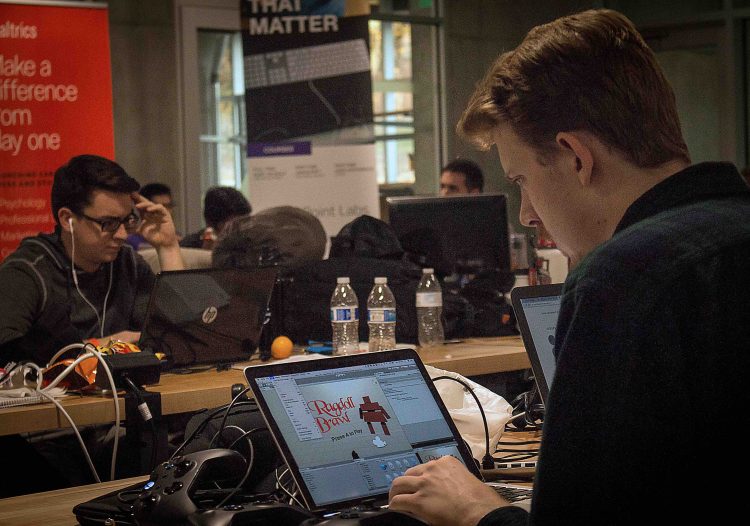at the University of Utah
Hackathon: When hacking and disrupting are good things
Fifty years ago, if you described someone as a “disruptive hack,” the comment would be interpreted as less than flattering.
But in the 21st century, “hacker” and “disruptor” can be positive descriptors for tech savvy creatives who come together for hackathons, competitive events that combine communal brainstorming and creative collaboration.
On Friday, Nov. 11, designers, coders and innovators gathered at the University of Utah’s Lassonde Studios for the first annual, 24-hour HackTheU competition.
University of Utah BS/MS Computer Science major Johnny Le recognized that a hackathon would be a great way to bring a community of people together to share ideas and design positive solutions to problems.
“I’m interested in creating opportunities for positive change,” Le said, “and there’s no other event like this on the U campus. I was able to collaborate with amazing people from across the university, and together we created HackTheU.”
Upon checking-in, participants chose one of three categories put forth by event sponsors Microsoft, Best Friends Animal Sanctuary, and the David Eccles School of Business’s Sorenson Center for Discovery & Innovation’s Games4Health Challenge. All submissions also qualified for an AR/VR prize category.
Criteria used for judging each challenge was “Most Innovative,” “Best Technical” and “Biggest Impact,” with more than $5,500 in cash and electronic accessory prizes.
Microsoft Business Sales Specialist Justin Lee stated that he was “impressed by the quality of the teams and the projects,” and that the winners of the Microsoft challenge “have a real opportunity of being published in our ecosystem.”
HackTheU gave students the opportunity to try something new and grow their skill set. The team that won the Windows Universal Application Challenge created “Hack The Music,” a VR experience designed to be therapeutic and relaxing. HackTheU was winning team member Georbec Amman’s first hackathon, and he said that he “learned a ton about how to rapidly collaborate.”
Hackathons can also serve as a vehicle to help students shape and solidify ideas.
“The hackathon really helped us direct our brainstorm toward the topic of ADHD,” U Film and Media Arts major Rob Baer said.
Baer and his “Bit Flips and Chill” team created ADHQ, a game designed to help children and young adults manage ADHD symptoms. Their team won the Games4Health challenge category, plus, Baer added, “We had a ton of fun making this game.”
For the Hack to Save Homeless Pets challenge, participants were asked to create a unique solution to a community’s displaced pet problem. The winning submission, aptly named “Go Fetch,” uses a Google Map-based mobile application that allows users to report and search for lost pets.
HackTheU was a first-time production for Johnny Le and Sorenson Center for Discovery & Innovation Manager Cesar Sanchez, who co-produced the event.
Last Spring, Le said, “HackTheU was nothing more than an idea. But last weekend, as I stood in front of the crowd of future innovators, I felt an incredible satisfaction. Thanks to our generous sponsors, dedicated team, volunteers and partners, we realized the dream of providing an empowering opportunity to students.”





